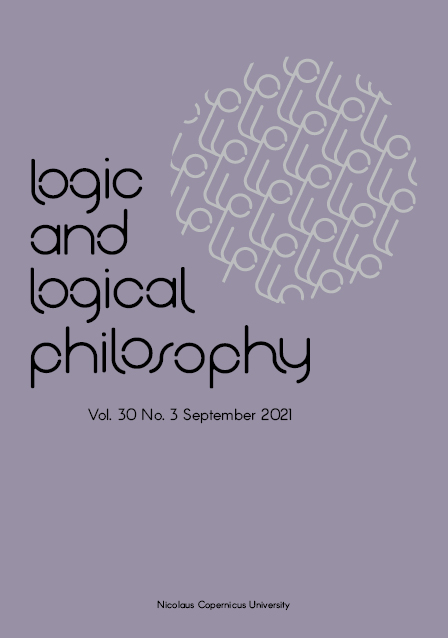States of Affairs as Structured Extensions in Free Logic
DOI:
https://doi.org/10.12775/LLP.2020.025Keywords
states of affairs, structured objects, non-existence, extension, extensionality, free logicAbstract
The search for the extensions of sentences can be guided by Frege’s “principle of compositionality of extension”, according to which the extension of a composed expression depends only on its logical form and the extensions of its parts capable of having extensions. By means of this principle, a strict criterion for the admissibility of objects as extensions of sentences can be derived: every object is admissible as the extension of a sentence that is preserved under the substitution of co-extensional expressions. The question is: what are the extensions of elementary sentences containing empty singular terms, like ‘Vulcan rotates’. It can be demonstrated that in such sentences, states of affairs as structured objects (but not truth-values) are preserved under the substitution of co-extensional expressions. Hence, such states of affairs are admissible (while truth-values are not) as extensions of elementary sentences containing empty singular terms.References
Antonelli, A.G., “Proto-semantics for positive free logic”, Journal of Philosophical Logic 29, 3 (2000): 227–294. DOI: http://dx.doi.org/10.1023/A:1004748615483
Carnap, R., Introduction to Semantics, Harvard University Press, Cambridge, 1942.
Frege, G., “Über Sinn und Bedeutung”, pages 40–65 in Funktion, Begriff, Bedeutung, ed. by G. Patzig, Göttingen: Vandenhoeck, 1986.
Lambert, K., “Predication and extensionality”, Journal of Philosophical Logic 3, (1974): 255–264. DOI: http://dx.doi.org/10.1007/BF00247226
Lambert, K., ed., Philosophical Applications of Free Logic, New York: Oxford University Press, 1991.
Lambert, K., Free Logics: Their Foundations, Character, and Some Applications Thereof, Sankt Augustin: Academia Verlag, 1997.
Lambert, K., “Free logics”, pages 258–279 in L. Goble (ed.), The Blackwell Guide to Philosophical Logic, Oxford: Blackwell Publishers, 2001.
Lambert, K., Free Logics: Selected Essays, Cambridge: Cambridge University Press, 2003.
Lambert, K., “Extensionality, bivalence and singular terms like ‘the greatest natural number’”, pages 21–27 in K. Lambert, E. Morscher and P.M. Simons (eds.), Reflections on Free Logic, Münster: Mentis, 2017. DOI: http://dx.doi.org/10.30965/9783957438362_005
Leeb, H.-P., “A state-of-affairs-semantic solution to the problem of extensionality in free logic”, Journal of Philosophical Logic 49, 6 (2020): 1091–1109. DOI: http://dx.doi.org/10.1007/s10992-020-09550-z
Morscher, E., and P.M. Simons, “Free logic: A fifty-year past and an open future”, pages 1–34 in E. Morscher and A. Hieke (eds.), New Essays in Free Logic: In Honour of Karel Lambert, Dordrecht: Kluwer Academic Publishers, 2001.
Nolt, J., “Free logics”, pages 1023–1060 in D. Jacquette (ed.), Philosophy of Logic, Amsterdam: Elsevier, 2007. DOI: http://dx.doi.org/10.1016/B978-044451541-4/50027-0
Quine, W.V.O., Word and Object, Cambridge: The MIT Press, 1960.
Downloads
Published
How to Cite
Issue
Section
Stats
Number of views and downloads: 1083
Number of citations: 1







